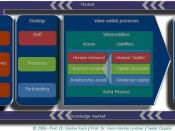The example of the slave boy in Plato's meno helps to support Plato's argument that we do not just have knowledge, and that we know things only by recollection. The theory of recollection investigates if we have already learned knowledge by previous experiences. There are several questions to raise with this theory such as where knowledge comes from in the first place and what exactly it is that we are remembering. The theory tries to help solve the main problem of the paradox of enquiry. It also looks at the difference between knowledge and self belief- and we can observe that Plato is perhaps suggesting a posterion knowledge, which is based on observation.
Socrates explains to Meno that ''we have lived man lives, seen things. and the soul has learned everything; we are able to recall what we have learned.'' He believes that he cannot teach knowledge, and when he brings in the slave boy he asks him a series of questions which evokes him to remember basic knowledge he has learned before, enabling him to apply what he knows to working out the problem.
He points out each stage of the boy's progress and proves that he has not told him anything, he has only asked questions and built up the knowledge that the slave boy already has within him to progress to a more complicated question. When the slave is unable to answer the most complicated question, he has realised what he does not know and is able to search for the truth. This supports the theory of recollection- the knowledge is not literally taught, we have the knowledge within ourselves. The slave is capable of recovering knowledge that he already has, and finding knowledge from within oneself is recollection.
However, an issue to raise with this...


